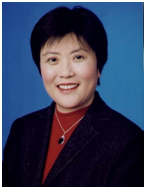时间:2014年2月27日(周四)下午2:00
地点:新主楼C706会议室
报告人:Liuping Wang 教授
讲座基本信息:
Liuping Wang 教授1989年获得英国谢菲尔德大学自动控制与系统工程系博士学位,之后依次在加拿大多伦多大学化学工程系,澳大利亚纽卡斯尔大学动力学与控制的中心工作,现任澳大利亚皇家墨尔本理工大学电气与计算机工程学院控制工程教授,International Journal of Control 和Journal of Process Control副主编,澳大利亚工程师协会Fellow。Liuping Wang 教授至今在系统辨识,PID控制,自适应控制,模型预测控制,过程控制、电气传动控制等领域共发表学术论文150余篇,领导和合作发表专著5部。本次讲座的主题是模型预测控制(MPC)。
主讲人介绍:
 Professor Liuping Wang received her Ph.D degree in 1989 from the Department of Automatic Control and Systems Engineering, University of Sheffield, UK. Upon completion of her PhD degree, she worked in the Department of Chemical Engineering at the University of Toronto, Canada for eight years in the field of process control. From 1998 to 2002, she worked in the Center for Integrated Dynamics and Control, University of Newcastle, Australia. In February 2002, she joined the School of Electrical and Computer Engineering, RMIT University, Australia where she is a Professor of Control Engineering. She has authored and co-authored more than 150 scientific papers in the field of system identification, PID control, adaptive control, model predictive control, electrical drive control and control technology application to industrial processes. She co-authored a book with Professor Will Cluett entitled From Process Data to Process Control- Ideas for Process Identification and PID control (Taylor and Francis, 2000). She co-edited two books with Professor Hugues Garnier entitled ‘ Continuous time model identification from sampled data’ (Springer-Verlag, 2008) and ‘System identification, environmental modelling and control’ (Springer-Verlag, 2011) . Her book entitled ‘ Model Predictive Control Design and Implementation using MATLAB®’ was published by Springer-Verlag in 2009, and the second edition of this book is currently under preparation. She is the leading author of the book entilted ‘PID and predictive control of electrical drives and power converters using using MATLAB®’ that will be published by Wiley in 2013. Dr Liuping Wang has successfully applied the predictive control technologies to food extruders, automotive brake-by-wire systems, magnetic bearing systems, electrical drives and power converters. Dr Liuping Wang is an associate editor of International Journal of Control and Journal of Process Control, and a Fellow of Institute of Engineers Australia.
Professor Liuping Wang received her Ph.D degree in 1989 from the Department of Automatic Control and Systems Engineering, University of Sheffield, UK. Upon completion of her PhD degree, she worked in the Department of Chemical Engineering at the University of Toronto, Canada for eight years in the field of process control. From 1998 to 2002, she worked in the Center for Integrated Dynamics and Control, University of Newcastle, Australia. In February 2002, she joined the School of Electrical and Computer Engineering, RMIT University, Australia where she is a Professor of Control Engineering. She has authored and co-authored more than 150 scientific papers in the field of system identification, PID control, adaptive control, model predictive control, electrical drive control and control technology application to industrial processes. She co-authored a book with Professor Will Cluett entitled From Process Data to Process Control- Ideas for Process Identification and PID control (Taylor and Francis, 2000). She co-edited two books with Professor Hugues Garnier entitled ‘ Continuous time model identification from sampled data’ (Springer-Verlag, 2008) and ‘System identification, environmental modelling and control’ (Springer-Verlag, 2011) . Her book entitled ‘ Model Predictive Control Design and Implementation using MATLAB®’ was published by Springer-Verlag in 2009, and the second edition of this book is currently under preparation. She is the leading author of the book entilted ‘PID and predictive control of electrical drives and power converters using using MATLAB®’ that will be published by Wiley in 2013. Dr Liuping Wang has successfully applied the predictive control technologies to food extruders, automotive brake-by-wire systems, magnetic bearing systems, electrical drives and power converters. Dr Liuping Wang is an associate editor of International Journal of Control and Journal of Process Control, and a Fellow of Institute of Engineers Australia.
讲座主要内容:
Model Predictive Control (MPC) has a long history in the field of control engineering. It is one of the few areas that has received on-going interest from researchers in both the industrial and academic communities. Three major aspects of model predictive control make the design methodology attractive to both engineers and academics. The first aspect is the design formulation, which uses a completely multivariable system framework where the performance parameters of the multivariable control system are related to the engineering aspects of the system; hence, they can be understood and 'tuned' by engineers. The second aspect is the ability of method to handle both 'soft' constraints and hard constraints in a multivariable control framework. This is particularly attractive to industry where tight profit margins and limits on the process operation are inevitably present. The third aspect is the ability to perform process on-line optimization.
The model predictive control systems are designed using linear models unless a nonlinear model is explicitly stated. Nonlinear model predictive control is conceptually similar to its linear counterpart except that nonlinear models are deployed for the prediction and optimization. However, because of its computational intensity and complexity, the nonlinear predictive control systems are not as widely applied as its linear counterpart. Instead, the gain scheduled control system techniques have found success in the area of predictive control of nonlinear plants. This one-day short-course will show the four steps involved in the design of a gain scheduled predictive controller: (i) linearization of a nonlinear plant model according to operating conditions; (ii) the design of linear predictive controllers using the family of linear models; (iii) gain scheduled predictive control law that will optimize a multiple model objective function with constraints, which will also ensure smooth transitions (i.e. bumpless transfer) between the predictive controllers; (iv) simulation and experimental validation of the gain scheduled predictive control system with constraints using MATLAB® and Simulink® as a platform.
